 |
| Sheepsheadhall Cottage, Bradmore Lane Photograph A Nott / G Knott part of the Images of North Mymms collection |
The spot where Sheepsheadhall Cottage once stood (location - https://w3w.co/gloves.head.every) is a third of a mile west of the junction with what is now Station Road.
The compact "brick, timber, and tiled" cottage, with a "parlour, living room, and scullery" downstairs and four bedrooms upstairs, stood at the point where the woodland meets a field. There were "good gardens" and a "well of water".
The descriptions of the cottage, set out above, were taken from an auctioneer's brochure from July 26, 1922 when 800 acres of the North Mymms Park Estate went under the hammer.
The land up for sale was divided into 20 lots. Sheepsheadhall Cottage was part of lot seven, which is shaded in pink on the map from the auctioneer's particulars below.
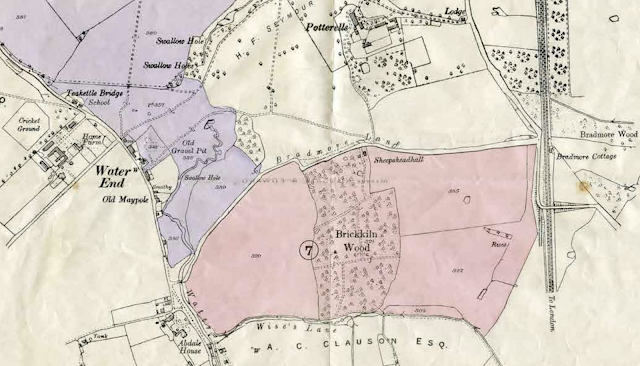 |
| Map from a section of the "particulars, plan, and conditions of sale" Sheepsheadhall (all one word) is middle top of the pink section Click here for a larger version |
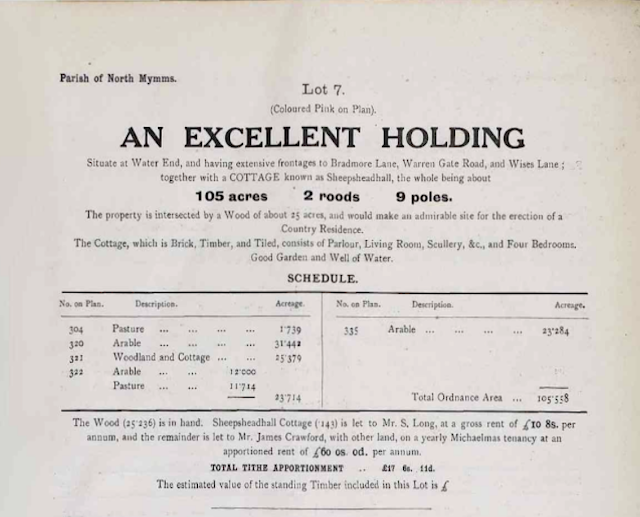 |
| Section of the "particulars, plan, and conditions of sale" Click here for a larger version of the auction details |
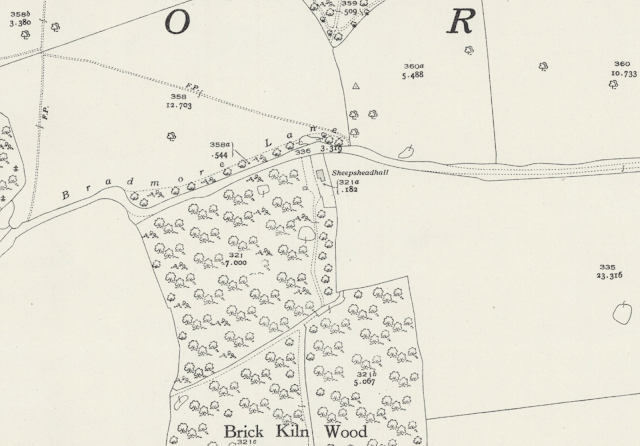 |
| The Ordnance Survey (OS) map for 1936 shows Sheepsheadhall centre top Image courtesy of the National Library of Scotland (NLS) Click here for a larger version |
 |
| The Dury & Andrews1766 map showing 'Ships head Hall' on Bradmore Lane |
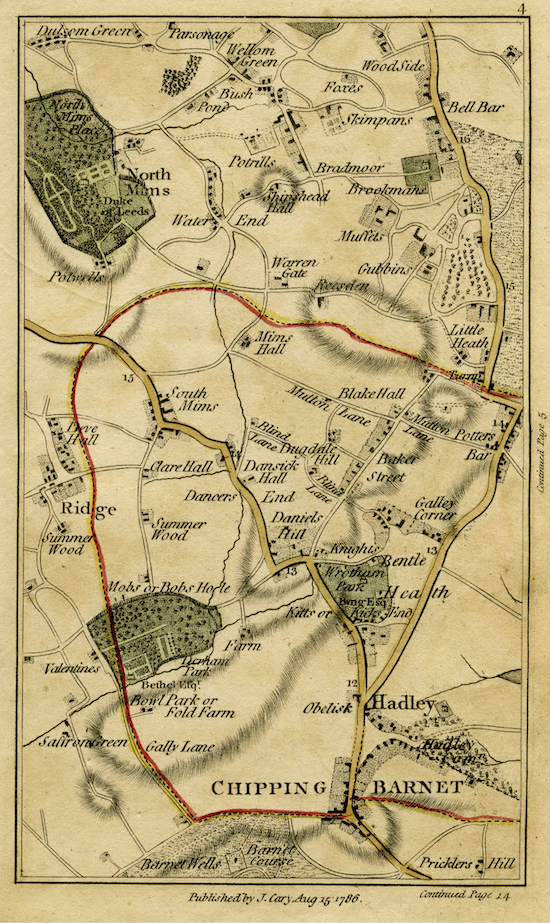 |
| The John Cary 1786 map - Peter Miller Collection Click here for a larger version |
But, thanks to records from the Peter Miller Collection, we have been able to go through the census information for the house between 1841 and 1911 in order to find out the names of some of those who lived there over the years. We can see that the cottage was the home of various agricultural labourers and gamekeepers over the years.
1841
Joseph Gower (70) Agricultural Labourer
George Gower (20) Agricultural Labourer
1851
John Bitchener (36) Agricultural Labourer
Rachel Bitchener (36) Wife
1861
John Burr (37) Gamekeeper
Sarah Burr (30) Wife
Samson (11) Scholar
William (9) Scholar
Ellen (5) Scholar
Arthur (4) Scholar
Susannah (2)
1871
William Knott (40) Gamekeeper
Rebecca Knott (42) Wife
William David (14) Undergardener/Domestic (Tom Nott’s father)
Harriett (10) Scholar
George James (6) Scholar (Later to become the photographer of North Mymms)
Eliza Kate (4) Scholar
1881
William Knott (50) Gamekeeper
Rebecca Knott (52) Wife
Eliza Kate (14) Scholar
Mary Matilda (7) Scholar
1891
William Knott (60) Gamekeeper
Rebecca Knott (62) Wife
Mary Matilda (17)
1901
Noah Smith (52) Gamekeeper
Sarah Smith (53) Wife
Frederick (22) Gamekeeper
Lavinia (20) Laundress
Bernard (17) Builders Labourer
Ernest (15) Gardener/ Domestic
Kate (13)
Ethel (8)
Leslie (6)
1911
Noah Smith (62) Gamekeeper
Sarah Smith (64) Wife
Bernard (27) Bricklayer
Ernest William (25) House Painter
Kate (23) Laundress
Ethel Margaret (18) Laundress
Albert Leslie (16) Gardener
The location of Sheepsheadhall Cottage is edged in green on the map below.
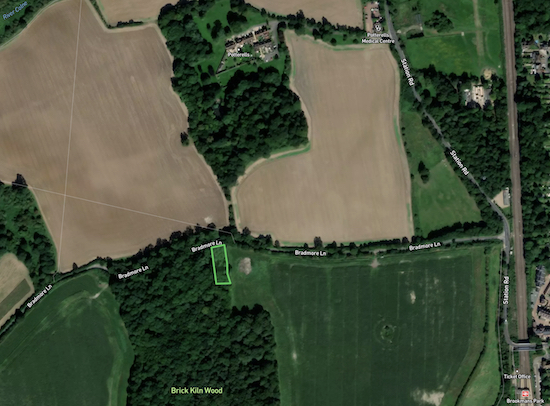 |
| The site of Sheepsheadhall Cottage is edged in green Map created on Maphub by the NMHP © Mapbox © OpenStreetMap © Maxar Click here for a larger version |
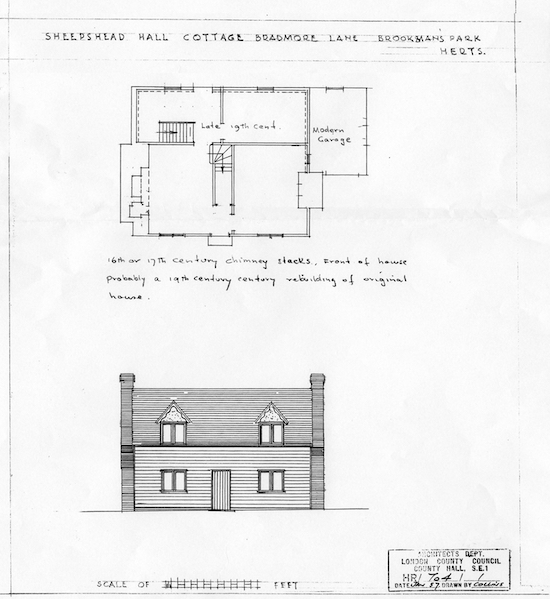 |
| Sheepsheadhall Cottage plan - click here or on image for a larger version Drawing courtesy of the Peter Miller Collection |
William Knott of Sheepsheadhall - gamekeeper at Potterells
 |
| The Knott family outside Sheepsheadhall in the late 19th century L-R standing William David, Eliza Kate, Mary Matilda, George James Seated William and Rebecca J.P. Stephen / Peter Miller Collection |
“My grandfather told me that when he was married, he was gamekeeper at High Cannons, Shenley, next door to the Old Guinea pub at Ridge. He had two sons and three daughters. In due course he heard Mr. Cotton Curtis at Potterells, North Mymms, needed a gamekeeper. He applied, was accepted, and came to live at Sheepshead Hall, Bradmore Lane.William was a generous man when it came to family and there was always room for one more in Sheepsheadhall. His grandson Tom continues:
“His sons were educated in an old workhouse which stood on the same site as the present boys’ school; then the older one worked in the gardens for Mr. Cotton Curtis under the head gardener, Mr. Farren, while the younger George J Knott started as a waiter, later becoming the first photographer in North Mymms.”
“When the older son was twenty he met the cook at Moffats House, Moffats Lane, and they were to become my parents. My father naturally wanted to better himself before marriage, and so answered an advertisement for a head gardener in Caterham Valley Surrey. He was accepted, and they were married at Croydon Parish Church. A house went with the job, but with certain conditions: Not too many children, and no washing to be hung out in view of the carriage drive.William's employer, Cotton Curtis, was a London banker. According to various reports he welcomed locals to visit Potterells at certain times. This from ‘Gleanings of North Mymms’...
“First a son was born, followed by a daughter, then another son, so my parents, to keep the job, brought the baby to his grandparents to be brought up at Sheepshead Hall. But two more daughters came along, so they got notice to quit.”
“Many church and Sunday school treats took place in one of their fields, weather permitting, and each child returned home tired but happy, clutching an orange in one hand and a bag of sweets in the other. Beatrix Potter (journal of Beatrix Potter from 1881-97) recalls a delightful visit by pony and trap from Camfield Place, while staying with her grandparents, to take tea with Mr. and Mrs. Cotton-Curtis.”William Knott was good at keeping his growing family busy. Tom Nott remembers how as a small boy his grandad was always keen to enlist their help as unofficial gamekeepers.
“Grandfather used to send my brother all round Bradmore Fields to drive the pheasants back and report if any poachers were about. Then he would meet up with him at the top of Bradmore Lane.According to Tom Nott, the dead man was thought to be a jeweller from London who was wearing a gold watch and chain, “but it was not proved and the watch never found, although the pond was drained, so he was buried in the churchyard as an unidentified person.”
“One morning, my brother told him. "Grandad, there’s a man in the pond down there". "You get off to school lad - you don’t want to know anything about that," said my grandfather, and continued down the field.
“Before reaching the pond he met Mr. Crawford’s shepherd and said, "Bill, there’s a man in the pond, what are you going to do about it?" He replied, "You found him, so you’d better tell the police."
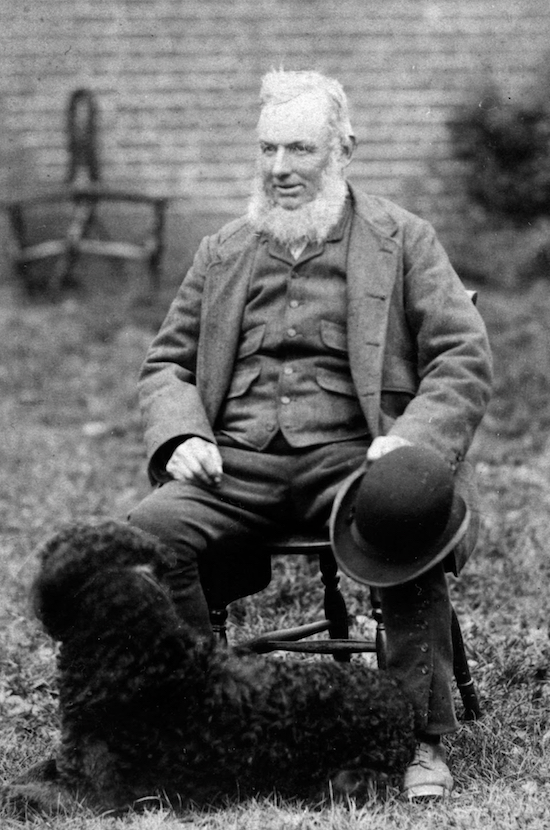 |
| William Knott of Sheepshead Hall in the 1890s Image A Nott / G Knott part of the Images of North Mymms collection |
Noah Smith of Sheepsheadhall - gamekeeper at Potterells
Noah Smith was one of the last gamekeepers to live at Sheepsheadhall. Like his predecessor, William Knott, Noah sported a lion’s mane beard, wore a bowler hat and breeches, and had his gun dog by his side.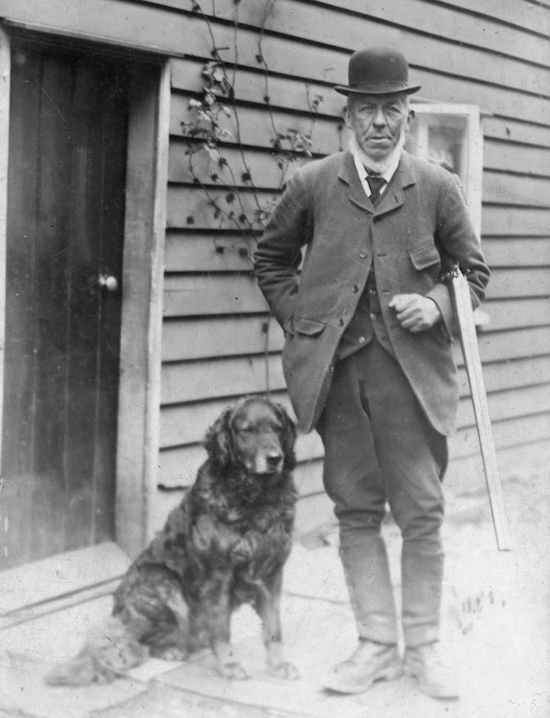 |
| Noah Smith outside Sheepshead Hall in the 1900s Image A Nott / G Knott |
The decline of Potterells and Sheepsheadhall
According to archaeological historian John Brushe, Potterells emerged around the fifteenth century as a sub-manor of Brookmans and continued to be attached to Brookmans until 1632 when the reversion was sold to Thomas Coningsby of North Mymms Park.The Coningsbys sold North Mymms Park in 1658, when Potterells became their family seat. In 1792 Potterells was left to Justinian Casamajor and was described as “a small estate of some 200 acres”.
In 1908 Potterells was bought by Hugh Francis Seymour. The Seymours remained at Potterells until 1933 when the house was sold. The house was sold again in 1965 and was demolished in the 1990s.
 |
| Potterells house in ruins in 1970 Image by V Barnard part of the Images of North Mymms collection |
 |
| Potterells Lodge, replaced by the Seymour family in 1906-08 Image courtesy of P Grant / G Knott part of the Images of North Mymms collection |
 |
| Sheepsheadhall Cottage would have been on the left at the first bend heading west Image by the NMHP part of the Images of North Mymms collection |
 |
| The cottage would have been on the right at the final bend heading east Image by the NMHP part of the Images of North Mymms collection |
Comments and information welcome

If you have anything to add to this feature, or just want to add your comments, please use the comment box below.

No comments:
Post a Comment
Comments on this piece
If you have any information to add to this item, please use the comment box below. We welcome input and are keen to update any piece with new research or information. Comments are pre-moderated, so there will be a delay before they go live. Thanks
Further information
If you require any further information relating to this, or any other item, please use the contact form, because we are unable to reply directly to you via this comment box. You can access it from the 'contact us' link at the top of any page on the website, at the bottom of the right hand side of the website, or at the bottom of any page.